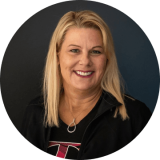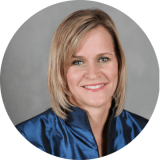Can We Learn From History?
For instance, some organizations outperformed their peers through the 2008 Financial Meltdown and ensuing Great Recession. And if we look back to 2001, some companies delivered growth despite the 9/11 attacks and the ensuing deep recession.
As we find ourselves in a post-pandemic 2022, Alexander Group is exploring the leadership tenets that inform the revenue functions of companies to deliver consistent, enduring growth regardless of economic conditions.
The research reveals that it is possible to survive a storm of economic uncertainty and learn from those times so businesses can thrive in the future. If so, what sets these unique leaders apart, and can we learn from them to create sustainable business growth?
Alexander Group’s Women Revenue Leaders Forum demonstrated that leaders are embedding sustainable leadership tenets into their companies to grow people, customers and profits during the most challenging times.
Enduring Leadership: Embedding a People-First Approach
With a pandemic and resulting business challenges fresh in mind, leaders are learning not just to weather an occasional storm but to embed a new mindset of continuous change within their organization. Recent hardships taught us that a strong leadership foundation that is focused on people—employees, customers and business partners—will sustain growth.
What separates these organizations? Alexander Group’s research has identified eight tenets of Enduring Leadership, the ability to drive long-term business health, resilience and growth.
The Eight Tenets of Enduring Leadership
Speakers and guests of the 2022 Women Revenue Leaders Forum explored the role of Mission, Culture and Talent in their respective companies. Their experiences provide rich examples of why missions matter and how to consistently build a people-based culture while nourishing the talent that supports the organization. The Operations Forum in August 2022 will further explore the role of operations in firms that exemplify an enduring leadership approach. Alexander Group’s research and the experience of forum speakers contributes to the understanding that:
The secret to enduring leadership companies is that they care deeply about the people in their company and the customers they serve.
The speakers at this year’s Women Revenue Leaders Forum included:

Teresa Anania
SVP, Global Customer Success, Renewals & Customer Experience, Zendesk

Deb Cupp

Christy Del Regno

Kelly Jones

Deborah McFarlane

Lynn Moersch

Tracy Nolan

Robin Norris

Shi Riddle

Arquelle Shaw

Susan Tousi

Deirdre Tully

Leagh Turner

Lisa Valentino

Victoria Yuan
Learn More About Our Upcoming Forums
Missions Make a Difference
Mission statements share common characteristics that include:
No mention of a product or company goals
A focus on how to help the customer in a very meaningful way
An aspirational tone
Forum speakers addressed specific ways in which their organizations embrace their mission.
Deb Cupp, Microsoft
To empower every person and every organization on the planet to achieve more.
Tracy Nolan, T-Mobile
Redefining the way consumers and businesses buy wireless services through leading product and service innovation.
Tracy explains how that mission comes to life at T-Mobile, “It’s not about who reports to who, because the bottom line is, we ultimately have one vision and one mission to achieve. We work together. Each VP examines it from various perspectives. They don’t have to wait for higher-ups to pull it together—they do it. We’ve leveled it here at T-Mobile.”
Tracy shares that for her, a key component to authentic and transparent leadership is ruthless integrity. As a leader, do they trust you? Do they believe you’re committed, that you can execute well, that you’re a team player? Does your team feel you’re the right person to lead that team? That respect is earned. For enduring leaders, you never stop earning it.”
Susan Tousi, Illumina
Unlocking the power of the genome for human health.
Leagh Turner, Ceridian
Makes Work Life Better™
Lisa Valentino, The Walt Disney Company
To entertain, inform and inspire people around the globe through the power of unparalleled storytelling, reflecting the iconic brands, creative minds and innovative technologies that make ours the world’s premier entertainment company.
Our speakers demonstrated that mission statements at enduring companies empower their teams to act in ways that meet the customer's interests while maintaining the integrity of the business. As a result, energized people and teams have the freedom to act in powerful ways that benefit the customer.
Culture Must Be Proactive and Have a Desire to Improve
Culture establishes the tone for success, promoting an atmosphere of always moving forward. However, embracing change is necessary for tackling future challenges, especially in a post-pandemic landscape. While the classical definition of culture includes “the social behavior, institutions and norms found in human societies,” an enduring culture prefers action and has a passion for improvement. These characteristics are the foundation for a dynamic culture that leads during changing times without staying tied to outdated attitudes and behaviors.
The forum leaders shared how new cultural norms are taking hold within their organizations.
Learn it all and stay humble
Enduring cultures are the opposite of “know it all.” Leaders in enduring cultures want to “learn it all.” They are deeply curious. They are curious about what employees think. They know the best ideas “are always on the ground,” and they strive to unlock this wisdom by asking for input informally on matters such as “the mission as it affects them” or by systematically surveying employee ideas.
“We implemented surveys, hosted town halls and, what we call ‘brave conversations,’ where we invite 30 to 40 people to share their stories in a very safe environment,” stated Lisa Valentino of The Walt Disney Company. “And there are Slack channels that accompany all of these efforts. That’s where you see the real conversations come through.”
Learning it all means you acquire knowledge of the customer within the context of the solutions you have to offer. If you want customers to invest time in you, bring something to the table that is important to them.
Enduring leaders are also curious about what their customers think, depending on research and outreach to interact with customers. For example, Teresa Anania shared, “We have a term at Zendesk we use: “humblident.” It describes the way we want to show up internally and externally. It’s a combination of being humble and learning, seeking to understand and being confident in having a point of view, and feeling safe to express it. So that term ‘humblident’ is critical for us.”
Balance data and experience
Enduring leaders have a bias toward action. Teresa Anania of Zendesk believes that in the digital age, action can be stalled by the inclination for more or better data. Enduring leaders use data but must also know when they have enough information, and it is time to act. Rough correlations are often good enough and waiting too long can cost you. Be comfortable with informed decisions that depend on both data AND wisdom.
Don’t wait for perfect data. Don’t overthink it. Look to your experience, know the key moments of truth.
Teresa Anania, Zendesk
Failure leads to mastery
Deb Cupp shared that innovation depends on employees feeling safe enough to fail. She noted, “How do I encourage people to take a risk? There can be a lot of fear in a culture. The smartest, most well-intentioned group of people I’ve ever worked with, the ones with the best ideas, are always on the ground. The ones who are closest to the customer have the experience every day. Why are they not speaking up?”
“We needed to create an environment where people felt like, ‘I can take a risk.’ I want people to say that I encourage risk. So, we started doing “loss reviews” to talk about them together and understand what happened. Why did we lose? What can we learn from this? Where are areas of opportunity for us to do better?”
Consistency and trust
The secret is doing what you say you're going to do and represent yourselves in the way that you're describing. And the rest of it just falls together.
Deb Cupp, Microsoft
Deb added, “One of the things I really like about Microsoft is we were very repetitive on things that we care about. It’s constantly making sure people understand how important it is to us and how important it is to them personally.”
Walking the talk
Tracy Nolan recalled an employee’s concern with about the mission; “You came up with a vision and mission that you think stands for us. And we’re close, but we’re not quite there. And we need to make sure you, the senior leadership team, is also going to live by those rules.”
To create an enduring culture, Tracy pointed out that consistency of behavior builds the trust needed to manage through turmoil; “I really want to make sure that we stay consistent and grounded on the fundamentals of the business while the winds are changing everything else that we’re doing because you have to have stability when it comes to your core fundamentals of the business.”
Enduring leaders make sure that they are consistent with the mission in both what they say and in how they behave.
Acting in times of crisis
Executives at enduring leadership companies appear to maintain a strong moral compass when it comes to customers and employees. Deb Cupp cited a memorable time when they needed to help others in times of crisis, no matter what it took.
“As the pandemic washed over the economy in 2020, at Microsoft Senior Leadership Team meetings the foremost point of discussion was ‘how can we help our customers do THEIR jobs? Like FedEx and UPS…how do we help them keep going?’ The conversations were not profit focused.
Our conversations were about ‘doing it the right way to get the outcome for the customer—the rest will follow.’
Deb Cupp, Microsoft
Deb added, “One of the things I really like about Microsoft is we were very repetitive on things that we care about. It’s constantly making sure people understand how important it is to us and how important it is to them personally.”
Doing the right thing
Enduring leaders create a culture of empowering and encouraging teams to do the right thing.
Tracy Nolan shared her experience of venturing into the field during the early days of the pandemic to find out for herself what was going on and then do what was right and needed.
“I’ve got employees who live in this area. I’ve got customers who live in this area. So give me a mask, give me a lot of hand sanitizer, and let’s go. And we went. And not only did we make sure that we’re handing out phones, I think I handed out something like 8,500 phones to people who were not necessarily our customers but were in the communities that needed help.”
She found that employees were also in dire need of help. “I was booking hotels for them anywhere they were if they were impacted by the virus. We put employees up in hotels, made sure they had food and made sure we didn’t have five people in one hotel room. If they had a big family, I got them two. So whatever it took, we took care of our family.”
T-Mobile did the right things for customers AND employees. “These things can, to a CFO, cost a lot of money. But let me tell you, they’re invaluable.” Tracy shared that the right thing pays off eventually and that by the end of 2021, T- Mobile:
- Became the second-largest wireless provider and the leader in 5G
- Achieved record profits, exceeding guidance
- Brought in nearly two times free cash flow vs. the prior year
Ruthless integrity
If you spot an outlier you can't ever just say 'it's okay.' You need to be vigilant.
Deb Cupp, Microsoft
Everyone must be on board and pull their weight. “Your culture will break down in a hot second if everything you’re saying is not represented by the people you surround yourself with. I think for me, it’s like ruthless focus on making sure the people that you bring to your company are the ones that represent the culture that you want,” said Deb.
Tracy Nolan added to the idea of ruthless integrity. “If I like a person, say Rob, and believe he will be awesome on this team, does Rob trust me? Does Rob think I have integrity? Does Rob think I’m committed? Does Rob think I’m going to be a good team player? Does Rob think I’m going to execute well? And help him execute? Does he think I’m the right person to lead this team? I have to earn that respect.” Enduring leaders demand fit with and cultural support from their people – and themselves.
A Team-First Talent Approach
The mark of enduring leadership is a talent approach that practices two principles. To begin with, “people first” means “team first,” and there must be accountability and support in balance.
Top-performing companies empower workers to come together to succeed as a team. In addition, executives should serve their teams, and teams should support each other.
The labor market is tight in today’s world, and the race for talent is running hot. In addition, Millennials now comprise the majority of the workforce and desire a professional life, career advancement and employers who demonstrate strong values. Everyone, including enduring leadership companies, is challenged to find talent to help them grow, so acquiring and keeping the best talent is also a challenge. Executives from enduring leadership companies feel this challenge too and believe in their ability to attract and grow the kind of talent needed to serve customers and enrich the culture.
1. Demonstrate Impact
Enduring leadership companies work very hard to show each team member how they deliver impact, and an enduring mission serves to guide their actions. These companies understand that talented people like to know that they make a difference as individuals participating in that mission. Enduring leadership companies go the extra mile to recognize this relationship.
Making a difference
Said Susan Tousi at Illumina, “We find that people come here because they feel like they can make a bigger difference as one person at Illumina, not only in their personal achievement but in the collaborative environment that they’re part of. We have a cross-functional team that’s working on market access and government affairs and clinical affairs and technology and applications, and customer support. Customers love the fact that we absolutely support them 100%. And it’s all these functions working together that create an environment where every individual feels like they can have a much bigger impact.”
Connecting the dots
Companies that prioritize talent are tireless in showing individuals how their efforts positively impact customers. For example, Deb Cupp told us, “I think individuals want to understand what they are accomplishing on behalf of a customer. So, we’ll go all the way down to a product-based example to help make this point.
“We’ll show an example of a product that we built for accessibility. And show how that accessibility created an opportunity for a customer to use that technology in a way they couldn’t before. And how that created reach for that customer in 17 countries. You connect the dots all the way from one end to the other so that people can see it.”
Enduring leadership companies take the time to show employees and team members how their efforts make a great mission come to life.
2. Modeling behavior
Casting a shadow
Trusting remote employees
Leadership examples matter
Hybrid models enable employees to balance office and remote time. Establishing that balance will be tricky. If the default is to simply revert to the office-only model, then the benefits of digital coverage will wither. Said Deb Cupp, “There was a meeting that was happening in-person, and I was not yet ready to get back on the road. And people were saying, ‘You’re not going to go?’ And I just said, you know what? We’re a hybrid company. We talk about creating space for people and having grace. I’m going to take the space in the grace, and I’m not going. And I’ll be there 100% but I’m going to be there using Microsoft Teams. I’m not going to be there in person. We lead by example.”
Enduring leaders know that their people are watching and judging how they act.
3. Practice new leadership traits
Companies continue to learn how to reach and serve customers digitally, honing technologies, processes and skills in a short two years. Most executives now agree that their companies cannot return to old, office-centric models. However, leaders now understand the need to balance vital human interactions with productivity-enhancing digital tools and in-person office culture. Hybrid models strive to include the benefits of all these elements.
But the hybrid model is indicative of numerous challenges that leaders now face. Our keynote speakers, Deb Cupp and Tracy Nolan, shared how their organizations are practicing new leadership traits.
Practicing empathy
In-person leadership
Leaders as change agents
Tracy shared, “We talk about it all the time, but I really am working hard to get people comfortable with change because I don’t see it stopping. I didn’t think we’d see a pandemic in my lifetime. I never thought 9/11 was going to happen. I could go down the list of things that I’ve seen. And so, two things are critical; agile work environments where people aren’t afraid of change and engagement in change, so the team owns it. To endure, we have to be change agents and make sure that we get our teams ready for what is coming next.”
If there is one truism across all enduring leadership companies, their leaders are comfortable with change. They recognize change on the horizon and challenge their teams to step up to it. As a result, enduring leaders are always highly effective change agents, willing to charge headfirst into the unknown.
Resiliency For Changing Times
The Women Revenue Forum leaders taught us that enduring leadership rises above tectonic change and extreme volatility. For the last 20 years, businesses have learned to thrive amid volatile global economics, terrorism and war, and a pandemic that threatened nearly 7 billion humans. Through it all, we learned that leadership that keeps the focus on connecting and valuing people both inside and outside the corporate walls end up delivering the best results.
How do they do this? By crafting missions that matter, and by nourishing cultures that put people first, knowing that talented, motivated employees are the best means to find and keep customers. Not every company will earn an Enduring Leadership badge. Only the top organizations can truly succeed over the long term. This year, the Alexander Group seeks to understand the people and programs that drive these companies to be top performers in turbulent and prosperous economic times. Stay tuned for more enduring leadership content as the Alexander Group explores how these principles set companies apart from competitors.
Alexander Group Calendar
Whitepaper: Revenue Leaders Have New Choices for Growth
Enduring Leadership: Eight Tenets for Revenue Leaders
About Alexander Group
Alexander Group understands your revenue growth challenges. Since 1985, we’ve served more than 3,000 companies across the globe. This experience gives us not only a highly sophisticated set of best practices to grow revenue—we also have a rich repository of unique industry data that informs all our recommendations. Aligning product, marketing, operations and finance efforts behind a successful sales organization takes insight and hard work. We help the world’s leading organizations build the right revenue vision, transform their organizations and deliver results.
